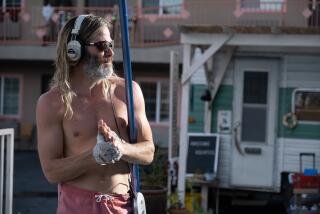MOVIE REVIEW : A Runyon for the Money in ‘Let It Ride’
- Share via
“Let It Ride” (citywide) has the makings of a real sleeper. In addition to its non-stop hilarity, it has a feel-good, send-’em-home-happy quality that has become one of the rarest of screen commodities.
It really is the kind of movie they don’t make anymore, on several counts. First of all, it’s a Runyonesque race-track comedy, a genre one might well have thought past reviving. Second, its humor is gentle and unpretentious: There’s no going for hard, slam-bang yocks or elaborate set-piece catastrophes requiring a legion of stunt people. Believe it or not, the abundant humor in the sterling screenplay Ernest Morton adapted from Jay Cronley’s “Good Vibes” actually derives from the foibles of human nature and not from special effects.
Richard Dreyfuss may have won an Oscar for his amusingly high-minded New York actor in “The Goodbye Girl” and given us plenty of laughs in “Moon Over Parador,” “Tin Men” and “Down and Out in Beverly Hills,” but it’s just possible he surpasses himself as Trotter, a Miamian who just can’t stay away from the horses. He is onscreen practically the entire film, and there is a terrific momentum he sustains as he roller-coasts between despair and elation. Determinedly jaunty--he prances when he’s ecstatic--he has the kinetic energy and fast retorts of James Cagney.
Resolutions are often made to be broken. When, over a Chinese dinner, Trotter vows to give up gambling while his adored wife, Pam (Teri Garr), promises to make no more scenes, you know this truce isn’t going to last beyond the fortune cookies.
“Let It Ride” gets under way--and never lets up--once Trotter’s taxi-driving pal Looney (David Johansen) tapes a back-seat conversation between two passengers discussing a fixed race at Hialeah. Trotter goes for it, rationalizing that a sure thing doesn’t constitute gambling. A couple of plot twists and turns later, he seems to be on an incredible winning streak. But what if it runs out?
There’s a terrific throwaway quality to the gags and the jokes that gives the film its blitheness. You’re reminded of vintage Hawks and Wilder and Sturges, of the Hollywood Golden Era comedies that sparkle timelessly because their makers didn’t take themselves too seriously, didn’t press too hard for laughs, but did cook up great lines for their wonderful supporting players.
“Let It Ride” has its own glorious character people. In addition to Garr’s loving but distraught wife and Johansen’s goofy loser, there is, most important, Allen Garfield’s Jockey Club rich guy with the pneumatic baby-voiced mistress (Jennifer Tilly); Robbie Coltrane’s sour ticket seller, whose view of Trotter moves from contempt to awe, and Michelle Phillips’ delicious blonde society tramp. (Accepting the offer of a drink from Trotter, she says breezily, “Why not? I’m on the pill.”) “Let It Ride” looks good in a low-key way, and Giorgio Moroder’s eclectic, funky mood-setting score is crucial in helping maintain tone as well as pace.
In an instance of saving the best for the last, “Let It Ride’s” special hero is its director, Joe Pytka, making his feature debut after years in documentaries, music videos and innovative, prize-winning commercials. He never lets archetypes slide into stereotypes or good nature drift into sentimentality, and he’s never afraid to let Dreyfuss and Garr seem anything less than the very bright people they are. “Let It Ride” (rated a rather severe PG-13) plays like an All-American, nose-thumbing, warmhearted yet undeniably dark-tinged comedy classic.
‘LET IT RIDE’
A Paramount Pictures presentation. Executive producer Richard Stenta. Producer David Giler. Co-producers Ned Dowd, Randy Ostrow. Director Joe Pytka. Screenplay Ernest Morton. Camera Curtis J. Wehr. Music Giorgio Moroder. Production designer Wolf Kroeger. Costumes Wendy Keller. Stunt coordinators Arthur Edwards, Bobby Foxworth. Film editors Dede Allen, Jim Miller. With Richard Dreyfuss, David Johansen, Teri Garr, Allen Garfield, Jennifer Tilly, Ed Walsh, Richard Edson, David Schramm, John Roselius, Joseph Walsh, Ralph Seymour, Cynthia Nixon, Richard Dimitri, Robert Towers, Michelle Phillips, Robbie Coltrane, Tony Longo, Mary Woronov.
More to Read
Only good movies
Get the Indie Focus newsletter, Mark Olsen's weekly guide to the world of cinema.
You may occasionally receive promotional content from the Los Angeles Times.









